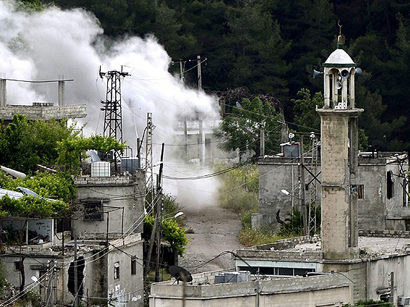A U.N. report released on Thursday concluded that chemical weapons have been used at least five times during the 2 1/2-year civil war, which has killed more than 100,000 people Al Arabiya reported.
"The United Nations Mission concludes that chemical weapons have been used in the ongoing conflict between the parties in the Syrian Arab Republic," Agence France-Presse quoted the report, which was prepared by a team of experts, as saying.
Chemical weapons were likely used in five out of the seven attacks investigated by U.N. experts in Syria, the report stated.
The deadly nerve agent sarin was also likely used in four incidents.
The report was presented on Thursday to U.N. Secretary-General Ban Ki-moon by Ake Sellstrom, the head of the team of experts on chemical weapons. It has been distributed to Security Council members and Ban was due to present it to the General Assembly on Friday.
Ake Sellstrom (L) hands his report over to Secretary-General of the United Nations Ban Ki-moon at the United Nations headquarters. (Reuters)
When he received the report, Ban called the use of chemical weapons "a grave violation of international law and an affront to our shared humanity."
"We need to remain vigilant to ensure that these awful weapons are eliminated, not only in Syria, but everywhere."
Activists and oppositions groups alleged that the Syrian President Bashar al-Assad's regime used chemical weapons against civilians in a Damascus neighborhood on Aug. 21.
Images of dead children from the Eastern Ghouta neighborhood compelled the international community to sound the alarm.
President Assad's government agreed to destroy its chemical weapons arsenal after the Aug. 21 Ghouta attack, which had led to threats of U.S. air strikes. Syria also acceded to the Chemical Weapons Convention.
The U.N. report concluded that the banned chemical weapons were used during the incidence.
The final report said the mission "collected clear and convincing evidence that chemical weapons were used also against civilians, including children, on a relatively large scale" on that day in Ghouta, AFP reported.
"A number of patients/survivors were clearly diagnosed as intoxicated by an organophosphorous compound," the report added.
"Blood and urine samples from the same patients were found positive for sarin and sarin signatures."
The Syrian leader has admitted his forces hold chemical weapons, and has vowed to surrender them to international experts. But he insists his forces did not target civilians.
The U.N. said it could not corroborate their use in two of seven sites studied - Bahhariyeh and Sheik Maqsood.
The report does not attribute blame for the attacks, as this was beyond the mandate given the team by the U.N. Security Council.
Western and Arab governments, human rights groups and Syrian rebels accuse the regime of carrying out the attacks. Assad and his allies in Moscow and Tehran blame the rebels.
Exact areas
The report cites "credible evidence" and "evidence consistent with the probable use of chemical weapons" in the Syrian areas of Ghouta, Khan al-Asal, Jobar, Saraqueb and Ashrafieh Sahnaya.
The inspectors collected "credible information" corroborating allegations that chemical weapons were used in Khan al-Asal on March 19 against soldiers and civilians.
In Jobar, near Damascus, the inspectors "collected evidence consistent with the probable use of chemical weapons" there on "a relatively small scale against soldiers" on Aug. 24.
But the report said it could not "establish the link between the victims, the alleged event and the alleged site" due to the "absence of primary information on the delivery system(s) and environmental samples collected and analyzed under the chain of custody."
In Saraqueb, the mission collected evidence "that suggests that chemical weapons were used" on a small scale there - "also against civilians" - on April 29 of this year.
In Ashrafiah Sahnaya, near Damascus, the inspectors collected evidence that "suggests" chemical weapons were used there on Aug. 25 "on a small scale against soldiers."
Here again, however, it was not able to establish the link between the alleged event, the alleged site and the survivors due to absence of primary information on the delivery system(s) and environmental samples, according to the report.
Another factor, it said, was that samples collected by the inspectors "one week and one month" after the alleged incident tested negative.
In Bahhariyeh and Sheik Maqsood, where the use of chemical weapons is alleged to have occurred on Aug. 22 and April 13 respectively, the U.N. could not corroborate the claims.
In Bahhariyeh this was due to the absence of positive blood samples, it said.
The Syrian regime had accused the opposition of using chemical weapons in Khan al-Asal, as well as in Jobar, Ashrafiah Sahnaya and Bahhariyeh.
The other alleged incidents were reported by the opposition or by Western countries supporting them.






